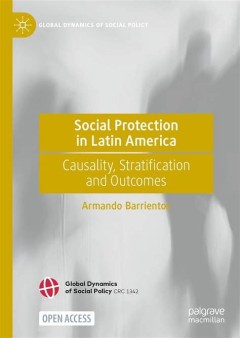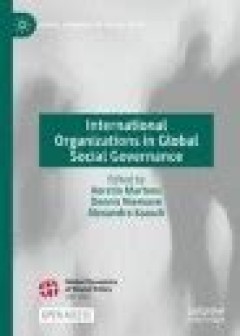Filter by

The Future of Education Policy in the State of Qatar
This open access book provides a topical overview of education, development plans, the knowledge economy, and human development in the State of Qatar, focusing on socio-political and cultural challenges, from a policy perspective. It describes the ecosystem of education and its features, impacts, and the factors that facilitate or inhibit its current shape and development, including the pendulu…
- Edition
- -
- ISBN/ISSN
- 9789819796663
- Collation
- XXII, 519 hlm; ill., lamp.,
- Series Title
- -
- Call Number
- -

International Impacts on Social Policy = Short Histories in Global Perspective
This open access book consists of 39 short essays that exemplify how interactions between inter- and trans-national interdependencies and domestic factors have shaped the dynamics of social policy in various parts of the world at different points in time. Each chapter highlights a specific type of interdependence which has been identified to provide us with a nuanced understanding of specific s…
- Edition
- 1
- ISBN/ISSN
- 9783030866457
- Collation
- XXVIII, 542 ill; hlm
- Series Title
- -
- Call Number
- -

Causal Mechanisms in the Global Development of Social Policies
This open access edited volume introduces the concept of causal mechanisms to explore new ways of explaining the global dynamics of social policy, and shows that a mechanism-based approach provides several advantages over established approaches for studying social policy The introductory chapter outlines the mechanism-based approach, which stands out by modularisation and a clear focus on acto…
- Edition
- 1
- ISBN/ISSN
- 9783030910884
- Collation
- XIX, 457ill; lamp
- Series Title
- -
- Call Number
- -

Social Protection in Latin America = Causality, Stratification and Outcomes
This book offers a comprehensive analysis of social protection in Latin America, its origins, institutions, and outcomes. The chapters are organised in three groups. The earlier chapters discuss in turn appropriate methods, an analytical framework, and core institutions. The book advocates a causal inference approach to the study of the institutions that have dominated social protection in t…
- Edition
- 1
- ISBN/ISSN
- 9783031497957
- Collation
- XIX, 293 ill; lamp
- Series Title
- -
- Call Number
- -

Stakeholder Relationships And Sustainability = The Case Of Health Aid To The …
This open-access book analyses how stakeholder relationships impact the sustainability of health aid. It does this by providing an overarching analytical framework, which allows for a systematic analysis of sustainability, relationships, and a possible causal link between these phenomena. The book goes beyond universal paradigms and detailed single-case studies by offering a thorough analysis o…
- Edition
- 1
- ISBN/ISSN
- 9783031319907
- Collation
- XXV, 381 ill; lamp
- Series Title
- -
- Call Number
- -

International Organizations in Global Social Governance
International Organizations (IOs) are important actors within global social governance. They provide forums for exchange, contention and cooperation about social policies. Our knowledge about the involvement of IOs varies significantly by policy fields, and we know comparatively little about the specific roles of IOs in social policies. This volume enhances and systematizes our understanding…
- Edition
- 1
- ISBN/ISSN
- 9783030654399
- Collation
- XXVII, 353 ill; lamp
- Series Title
- -
- Call Number
- -

https://link.springer.com/book/10.1007/978-3-030-95266-2
This open access book turns the research attention of social policy scholars and long-term care researchers from comparative descriptions of care systems, focusing mostly on expenditures and volumes of long-term care services, to outcomes, and in particular to the question whether older people really receive the support that they need. Without knowledge about which needs and which social groups…
- Edition
- 1
- ISBN/ISSN
- 978-3-030-97243-1
- Collation
- -
- Series Title
- Sustainable Development Goals Series
- Call Number
- XVII, 250

Israel’s Invisible Negev Bedouin : Issues of Land and Spatial Planning
This Brief provides a contextual framework for exploring the settlement rights of Israel's Bedouin population of the Negev desert, a traditionally pastoral nomadic Arab population. In 1948, the Israeli government relocated this population from the Negev region to settlements in Siyag. The explicit aim was to control the Negev area for security purposes, sedentarize a nomadic people, and to imp…
- Edition
- -
- ISBN/ISSN
- 978-3-319-16820-3
- Collation
- -
- Series Title
- -
- Call Number
- -
 Computer Science, Information & General Works
Computer Science, Information & General Works  Philosophy & Psychology
Philosophy & Psychology  Religion
Religion  Social Sciences
Social Sciences  Language
Language  Pure Science
Pure Science  Applied Sciences
Applied Sciences  Art & Recreation
Art & Recreation  Literature
Literature  History & Geography
History & Geography